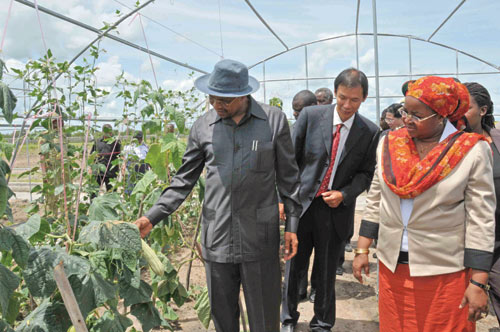
|
 |
|
Tanzanian President Jakaya Kikwete (left) and his wife Salma at an agricultural technology demonstration center set up by China in Tanzania. GUO CHUNJU / XINHUA |
At the Africa-Britain-China Conference on Agriculture and Fisheries in Beijing last month, a four-year China-UK program was launched to help African countries improve agricultural production in an effort to eliminate hunger.
The program — to which Britain is contributing 10 million pounds ($15.9 million) and China is contributing expertise — will ease the transfer of agricultural technology to countries in Africa and Asia. Pilot projects will be set up in Malawi and Uganda.
China's vice-minister of agriculture, Niu Dun, says that thanks to advanced technology and supportive policies, China's grain output has grown this year for the ninth successive year.
"In addition to realizing self-sufficiency in grain, China has helped other developing countries, especially in Africa, to improve agricultural productivity and food security in recent decades."
Cooperation with African countries, such as with freshwater fisheries and processing agricultural products, will be strengthened, he says.
The ministry will also continue to promote agricultural investment and development in Africa, and help to make agriculture self-sufficient, stressing the importance of exports.
Many Chinese companies are also involved in African agriculture.
Zhang Ke, a foreign aid project manager with Yuan Longping High-Tech Agriculture Co Ltd, says his company, founded in 1999, has trained people in almost all African countries that needed planting rice.
Training initially covers planting and irrigating hybrid rice, which was cultivated by the Chinese scientist Yuan Longping and has a higher yield than other strains.
Rice is the staple food for more than half the world's population and about 60 percent of China's 1.3 billion people.
"The training now involves many other crop varieties, such as hybrid corn and vegetables," Zhang says. "We have also begun to help with crop processing and storage."
In Liberia, the average harvest of hybrid rice is now as much as 5 or 6 metric tons a hectare, compared with a yield of 1 to 1.5 tons a hectare with local rice breeds, he says.
The increased harvest can partly be attributed to a lot of hard work in choosing seeds appropriate to local land and climate conditions, he says.
The company has promoted five to six hybrid rice breeds to plant in Liberia, selecting from more than 20 varieties. The breeds planted in Africa are always more resistant to high temperatures and local plant diseases and insect pests, Zhang says. "More training programs should help local farmers. It is only with advanced planting technology that the output of hybrid crops in African will continue to increase."
Contact the writers at jinzhu@chinadaily.com.cn and zhaoyanrong@chinadaily.com.cn